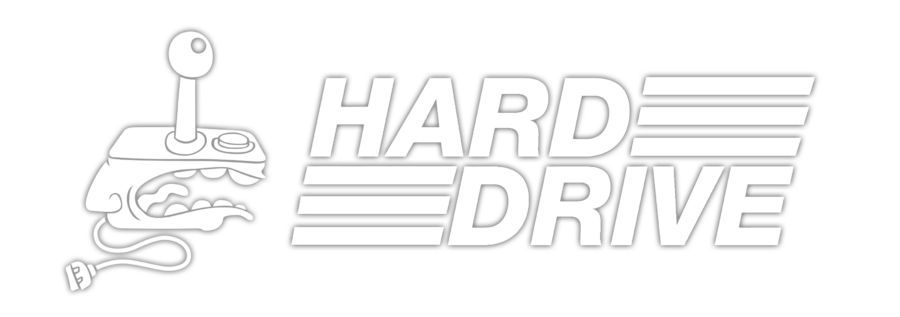My buddy’s daughter is a huge fan of everything about Pokémon except the violence that’s inherent to the premise. She loves all the different monsters and will draw pictures of them for hours on end, but has zero interest in playing most of the games. If she did, she’d have to make her Pokémon fight, and she’s not about that.
In retrospect, it’s odd that that isn’t a more widespread opinion. One of the oldest cliches in Internet-era comedy writing is making fun of Pokémon for its unsubtle undercurrents of animal exploitation and/or child labor, usually by leaning into the darkness of the premise (cf. Palworld). It’s much less common for anyone to try to reconstruct it from its basic principles, but omit all the aspects that we’ve come to recognize as weird.
Beastieball, now available in Steam Early Access, is a monster-collection RPG by Wishes Unlimited, which is a new name for an old team. Greg Lobanov, Alexis Dean-Jones, and Lena Raine previously collaborated on Chicory: A Colorful Tale, while Raine and Lobanov made the sleeper hit Wandersong before that.
With Beastieball, Wishes has made its biggest project yet. It’s not an explicit parody, but it’s a distinctly tongue-in-cheek take on the overall Pokémon concept.
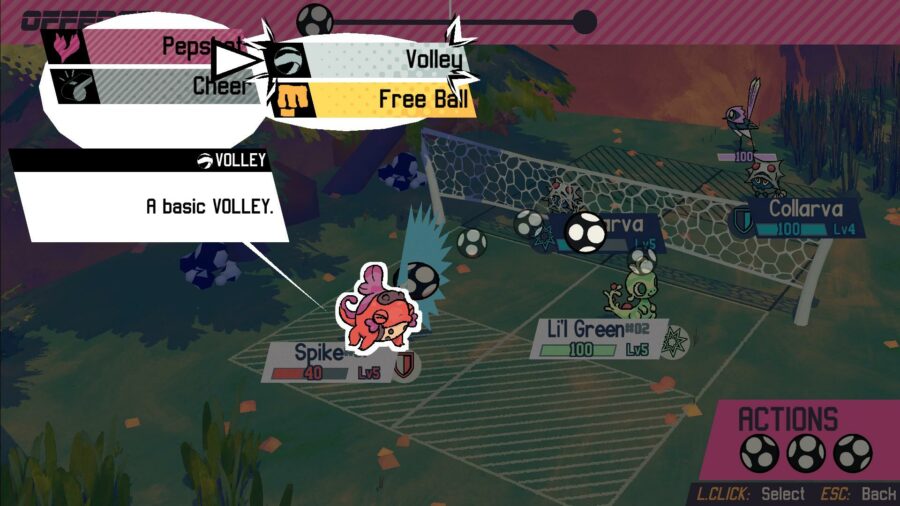
Your custom character in Beastieball enters the game as a kid in the backwoods village of Rutile. All Rutile really has going for it is its nature preserve, which is a vital habitat for a local population of “Beasties.” These easygoing monsters usually ignore humans, and can often be seen playing games with one another.
As you grow up, “Beastieball” becomes increasingly big business. Humans train to coach small teams of Beasties to play their trademark ball game against one another for fame, fortune, and glory. Every local village has a Beastieball gym.
One day, you go to hang out in the nature preserve and discover a fleet of bulldozers. The Beastieball league has plans to clear-cut the preserve to build a new stadium, despite the preserve’s status as a protected habitat. You immediately set out to become the next superstar coach with the first two friendly Beasties you can find, on the assumption that a new champion will have enough pull with the league to save Rutile’s preserve.
That sends you on a journey from town to town, where you’ll recruit new Beasties for your team, challenge other coaches, explore the wilderness, and evolve your individual monsters.
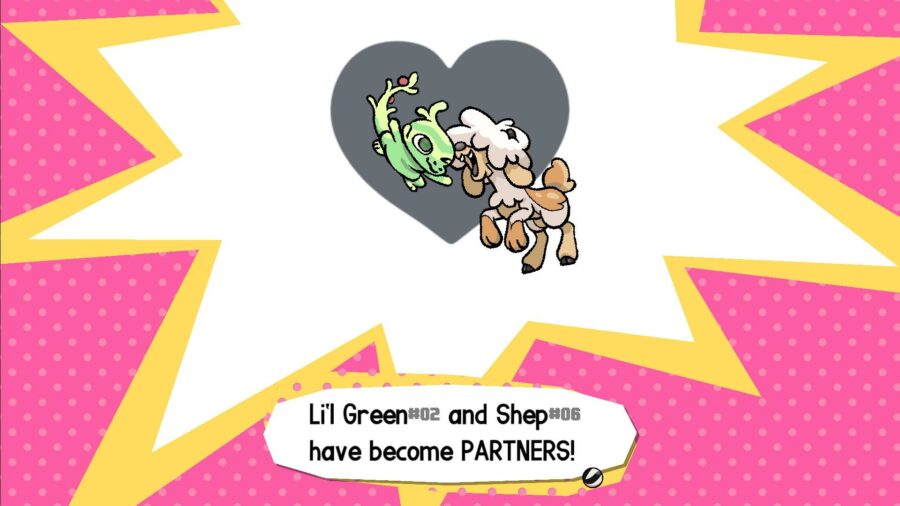
Much of Beastieball is self-consciously borrowed from the last few decades of various monster-collecting games, but with a deliberate emphasis on non-violence and consent. You don’t forcibly capture Beasties; you have to study their quirks, then impress them with smart play. If they like what you do, they’ll offer to join your squad.
Beastieball as a sport is essentially beach volleyball, with additional mechanics like trick shots, status effects, and shot placement. A Beastie that receives a serve loses some stamina, and if it reduces them to zero, they get “wiped” and have to hit the bench for a couple of turns. Nobody ever gets seriously hurt, and every game you play is optional.
In the field, a random game against wild Beasties is a simple first-to-1 match, while official league play can be best of 3 or 5. Once you have a rough idea of what an individual Beastie is capable of, it’s easy to come up with a strategy against them, but coached Beasties may have unusual new skills that’ll keep you guessing. By the same token, you can undertake team-building exercises to build your monsters’ bonds, which can unlock shared moves or unique combo skills.
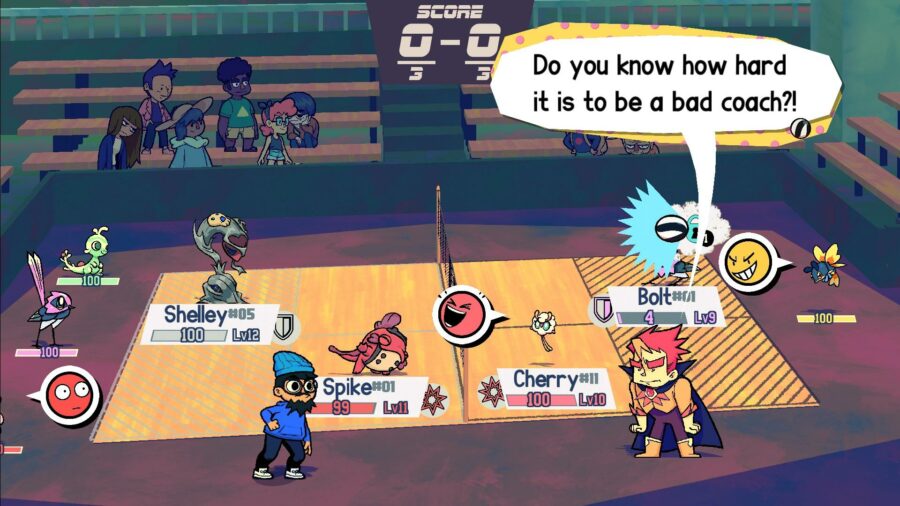
Beastieball is both more and less strategic than I expected. There’s a rock-paper-scissors element where you have exactly one chance to defend against your opponent’s return, so more than one match will come down to you making a blind guess. Against the CPU, your best bet is usually stacking defense modifiers on your weakest player, but it’s surprised me a few times.
Some of those surprises came from Beastieball’s semi-open world. Once you win the right to officially represent Rutile in league play, it lets you head off in whatever direction you like. There are a couple of barriers, like a team of level 27 Beasties that hang out in the woods southwest of Rutile, but there aren’t any guardrails to speak of. It’s up to you to explore in whatever direction you like and take your own path to the championship.
At time of writing, Beastieball has been in Early Access for almost a month, with plans for it to reach completion around the end of next year. The current version of the game features the full story, so you can play up to its end in about 15-20 hours.
As it stands right now, it’s a simple but absorbing spin on both JRPGs and sports drama. I want to compare it to Bad News Bears, or maybe one of those ‘80s movies where kids put on a show to save their local youth center.
It could use a few mechanical tweaks before it could be considered complete, however. Money in particular can be difficult to come by, as normal random encounters are worth almost nothing and supplies are all remarkably expensive.
It’s not a huge obstacle for progression, since you can rest for free in most places, but Beastie recruitment requires you to keep buying expensive Jerseys. If you actually want to collect monsters in this monster-collecting game, you often have to put it off until you’ve got more cash in hand.
There’s also a mechanic about building and maintaining in-game friendships that I don’t like that much. Whenever you overcome particularly tricky Beastieball bouts, you build your character’s Social Battery, which you can spend on hangouts with various NPCs you meet over the course of the game.
You eventually have to engage with the friendship system, as one of the mid-rank league coaches requires you to have at least one high-level friend before he’ll accept your challenge, but it’s a grind. In a game that’s otherwise gone out of its way to make grinding pointless, the friendship system feels out of place.
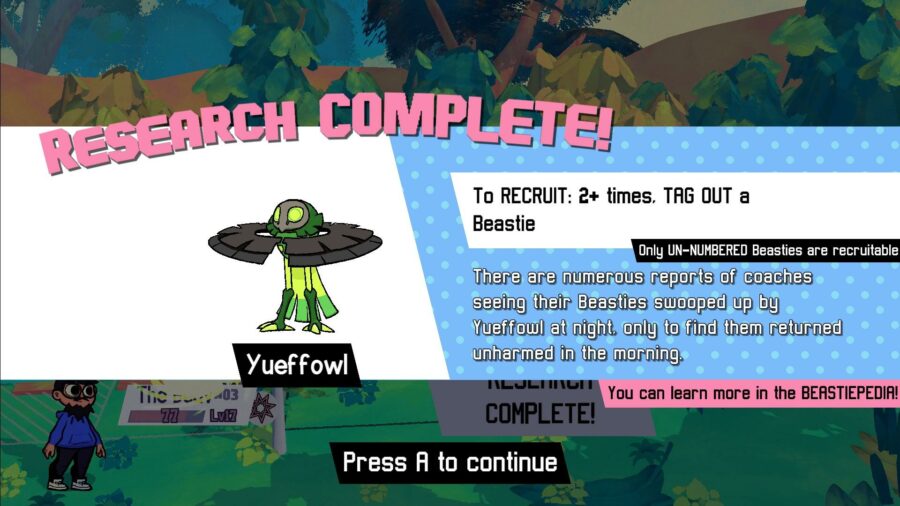
The basic structure here is solid, as is the weird little indie comic of a world that Wishes Unlimited has created. Beastieball is a cheerful, low-stakes, zero-violence spin on the monster-collecting genre. I don’t know how much demand there is for a non-violent sports/Pokémon JRPG, but I’m glad that one exists.
[Beastieball, developed by Wishes Unlimited and published by Kiei, is now available in Steam Early Access for $24.99. This column was written using a Steam code sent to Hard Drive by Greg Lobanov.]
